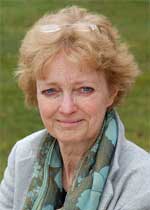|
 Last
month Wageningen University
and Research Centre in the Netherlands
has appointed Mrs Edith Lammerts van Bueren (photo) as
professor of organic plant breeding. She is the first professor
in this field in the world. Professor Lammerts van Bueren will
focus her research in the forthcoming years on the scientific
founding of the concepts and strategies for organic plant
breeding. She is one of the most prominent fore fighters of
organic breeding and seed production in Europe. Last
month Wageningen University
and Research Centre in the Netherlands
has appointed Mrs Edith Lammerts van Bueren (photo) as
professor of organic plant breeding. She is the first professor
in this field in the world. Professor Lammerts van Bueren will
focus her research in the forthcoming years on the scientific
founding of the concepts and strategies for organic plant
breeding. She is one of the most prominent fore fighters of
organic breeding and seed production in Europe.
Since last year organic farmers
in Europe are required to use organically produced seeds for
most crops. Several seed companies successfully introduced seed
that complies with the requirements for organic farming. That is
however but the first step. What organic farmers really need is
varieties that have the special characteristics they look for.
So far, only few organic varieties have been selected and bred.
The newly appointed professor Edith Lammerts van Bueren will
give the breeding a boost, is the general expectation.
Special requirements
As president and co-founder of
ECO-PB, the European Consortium
for Organic plant breeding, professor
Lammerts van Bueren knows what most of today’s varieties lack
from a organic point of view. “Traditional varieties are bred
for traditional growing techniques, using herbicides,
fungicides, insecticides, but also fertilisers. In contrast to
organic farming, the production per metre should be high, even
at the costs of disease resistance because the traditional
grower has the possibility to correct with chemical
measurements. Organic farming demands plants that grow in
balance with organic, low-input farm management.
|
Consortium |
|
ECO-PB, the
European Consortium for Organic plant breeding,
is an organisation in which several European
organic research institutes are brought
together.
Besides the Louis
Bolk Institute, the Netherlands, where Edith
Lammerts van Bueren works, the Danish Research
Centre for Organic Farming, Elm Farm Research
Center, UK, Forschungsinstitut für Biologischen
Landbau, Switzerland, Technique de l'Agricluture
Biologique, France, and the ArbeitsGemeinschaft
Ökologischer Landbau, Germany have joined
forces.
Their goal is to
initiate and support organic breeding programmes
by providing a platform for discussion and
knowledge exchange (www.eco-pb.org).
Besides these institutes, breeders from
companies involved with organics are part of the
network. |
|
Traits organic breeders are
looking for is broad resistance against diseases and pests,
supported by morphological and physiological characteristics to
avoid stress, such as a well developed root system. “Compost
releases nutrients in a far slower pace than artificial
fertilisers. A deeper reaching root system helps the plants to
absorb these nutrients and water more efficiently.” That is
however not all. Organic varieties also must be more resilient
to bad weather conditions and unfavourable circumstances. As
herbicides cannot be used, the plants habit should for instance
suppress germination of other species.
Last but not least the taste of
an organic product should satisfy high expectations. “Consumers
who are willing to pay extra for an organic product do so
because food is very important to them. Statistics show these
consumers choose for organics. The countries in Europe where a
large part of the income goes to food correspond to the
countries where a large part of agriculture is organic.”
Limited means
The methods to create a plant
with these characteristics is limited. Not only genetic
modification is banned, other laboratory based methods such as
in vitro propagation and embryo rescue methods might in future
not be permitted in certified organic breeding programmes.
One source for new organic
varieties are the gene banks. They possess old varieties that
are not useful anymore for the current traditional growers, but
may very well have characteristics that are vital for organic
growing. “The most appropriate way of breeding is looking at the
whole plant and the environment in which it grows. That means
that selection under organic conditions is the most obvious way
to come to new varieties. In Europe farmers and growers are
stimulated to partake in the effort to broaden the diversity of
varieties by participatory selection.”
Another pathway is to stimulate
commercial breeding companies with adapted programmes. Jan
Velema of the organic seed company Vitalis Organic Seeds has
proven that it can be successful. Vitalis forms part of Enza
Zaden and can therefore use plant lines that are being
developed. He has bred several varieties by finishing variety
development towards plants that combine the characteristics that
traditional growers need with organic characteristics.
Breeding organic varieties is a
long term endeavour. The percentage of organic farmers is small
in comparison to the traditional growing. The research done in
this field is therefore limited. But with Edith Lammerts van
Bueren as a professor in Wageningen, the Netherlands,
interaction between growers and breeders will be further
expanded to search for new ways to improve varieties. Organic
breeders in Europe are hopeful that the strategies she will
develop may stimulate breeding efforts and subsequently the
availability of organic varieties. |